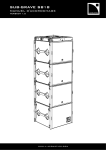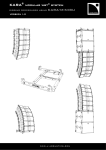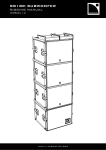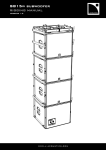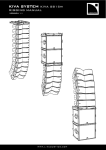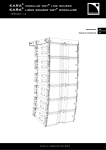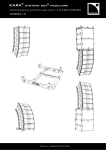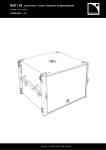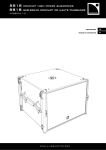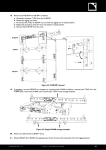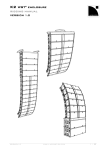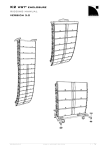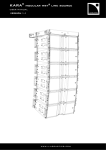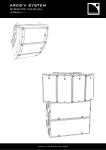Download Rigging Manual - Scandec Systemer
Transcript
SB18 SUBWOOFER RIGGING MANUAL VERSION 1.0 www.l-acoustics.com SB18 SUBWOOFER rigging manual VERSION 1.0 SAFETY INSTRUCTIONS 1. Read this manual 2. Heed all SAFETY INSTRUCTIONS as well as DANGER and OBLIGATION warnings 3. Never incorporate equipment or accessories not approved by L-ACOUSTICS® 4. Read all the related PRODUCT INFORMATION documents before exploiting the system The product information document is included in the shipping carton of the related system component. 5. Work with qualified personnel for rigging the system Installation should only be carried out by qualified personnel that are familiar with the rigging techniques and safety recommendations outlined in this manual. 6. Ensure personnel health and safety During installation and set-up personnel must wear protective headgear and footwear at all times. Under no circumstances personnel is allowed to climb on a loudspeaker assembly. 7. Respect the Working Load Limit (WLL) of third party equipment L-ACOUSTICS® is not responsible for any rigging equipment and accessories provided by third party manufacturers. Verify that the Working Load Limit (WLL) of the suspension points, chain hoists and all additional hardware rigging accessories is respected. 8. Respect the maximum configurations and the recommended safety level For safety issue, respect the maximum configurations outlined in this manual. To check the conformity of any configuration in regards with the safety level recommended by L-ACOUSTICS®, model the system in SOUNDVISION and refer to the warnings in Mechanical Data section. 9. Be cautious when flying a loudspeaker array Always verify that no one is standing underneath the loudspeaker array when it is being raised. As the array is being raised, check each individual element to make sure that it is securely fastened to the adjacent element. Never leave the array unattended during the installation process. As a general rule, L-ACOUSTICS® recommends the use of safety slings at all times. 10. Be cautious when ground-stacking a loudspeaker array Do not stack the loudspeaker array on unstable ground or surface. If the array is stacked on a structure, platform, or stage, always check that the latter can support the total weight of the array. As a general rule, L-ACOUSTICS® recommends the use of safety straps at all times. 11. Take into account the wind effects on dynamic load When a loudspeaker assembly is deployed in an open air environment, wind can produce dynamic stress to the rigging components and suspension points. If the wind force exceeds 6 bft (Beaufort scale), lower down and/or secure the loudspeaker array. SB18_RM_EN_1-0 www.l-acoustics.com 2 SYMBOLS The following symbols are used in this document: DANGER This symbol indicates a potential risk of harm to an individual or damage to the product. It can also notify the user about instructions that must be strictly followed to ensure safe installation or operation of the product. OBLIGATION This symbol notifies the user about instructions that must be strictly followed to ensure proper installation or operation of the product. INFORMATION This symbol notifies the user about complementary information or optional instructions. WELCOME TO L-ACOUSTICS® Thank you for choosing the L-ACOUSTICS® SB18 subwoofer enclosure. This document contains essential information on rigging the system properly and safely. Carefully read this document in order to become familiar with these procedures. As part of a continuous evolution of techniques and standards, L-ACOUSTICS® reserves the right to change the specifications of its products and the content of its document without prior notice. Please check the L-ACOUSTICS® web site on a regular basis to download latest updates for documents and software: www.l-acoustics.com. CONTENTS 1 RIGGING SYSTEM 4 2 2.1 2.2 MECHANICAL SAFETY 6 Maximum configurations ............................................................................................................................................................. 6 Assessing mechanical safety ......................................................................................................................................................... 6 3 3.1 3.2 SYSTEM SET-UP 7 Ground-stacking .......................................................................................................................................................................... 7 Flying ........................................................................................................................................................................................... 8 4 A. B. C. D. RIGGING PROCEDURES 9 Attaching an SB18 to a second element ...................................................................................................................................... 9 Preparing the M-BUMP stacking platform ................................................................................................................................ 10 Preparing the M-BUMP flying structure .................................................................................................................................... 12 Preparing the KARA-MINIBU flying structure ........................................................................................................................... 13 APPENDIX A: M-BUMP FLYING OPTIONS 14 APPENDIX B: KARA-MINIBU FLYING OPTIONS 16 APPENDIX C: INSTALLING THE LAP-TEQ INCLINOMETER 17 APPENDIX D: SAFETY PIN MECHANISM ON SHACKLES 17 SB18_RM_EN_1-0 www.l-acoustics.com 3 SB18 SUBWOOFER rigging manual VERSION 1.0 1 RIGGING RIGGING SYSTEM The system approach developed by L-ACOUSTICS® consists in providing packaged solutions for loudspeaker system in order to guarantee the highest and most predictable level of performance at any step: modeling, installation, and operation. An L-ACOUSTICS® loudspeaker system is the set of components available to form any loudspeaker system based on one of the full-range loudspeaker enclosure afforded by L-ACOUSTICS®. It includes enclosures, rigging accessories, loudspeaker cables, amplified controllers, and software applications. The SB18 subwoofer is especially adapted to the following systems: KUDO®, KARA®, KIVA/KILO, and to the coaxial XT enclosures from L-ACOUSTICS®. It extends the low frequency response of a loudspeaker system down to 32 Hz. The main components involved in the SB18 rigging process are the following: 1.1 Loudspeaker enclosure SB18 1.2 Compact subwoofer with captive rigging system Rigging elements M-BUMP Frame for flying or ground-stacking a vertical SB18 and/or KARA array, provided with 2 bow shackles (Ø19mm), 4 round-shaped ball-locking pins (5/16”), and 4 T-shaped ball-locking pins (5/16”) M-BAR Extension bar for the M-BUMP frame, provided with 2 bow shackles (Ø19mm) and 2 T-shaped ball-locking pins (3/8”) M-JACK Platform feet (x4) for M-BUMP provided in a package with KARA-ANGARMEX KARAMINIBU Frame for flying or stacking a small vertical SB18 and/or KARA array, provided with 2 bow shackles (Ø12mm) and 4 round-shaped ball-locking pins (5/16”) KARAMINIBUEX 2 Extension arms for the KARA-MINIBU frame, provided with 4 T-shaped ball-locking pins (5/16”); 6 screws (M8 x 25mm) and 6 self-locking nuts CLAMP250 Truss clamp 1.3 Software application SOUNDVISION 1.4 Proprietary 3D acoustical and mechanical modeling software. Accessories SB18PLA Removable front dolly board for moving the SB18 enclosure and protecting its front grill during transportation and storage SB18COV Protective cover for transportation and storage SB18_RM_EN_1-0 www.l-acoustics.com 4 SB18 SOUNDVISION M-BUMP M-JACK KARA-MINIBUEX M-BAR KARA-MINIBU CLAMP250 SB18PLA SB18COV Main components involved in the SB18 rigging process SB18_RM_EN_1-0 www.l-acoustics.com 5 SB18 SUBWOOFER rigging manual VERSION 1.0 2 2.1 MECHANICAL SAFETY Maximum configurations The SB18 rigging system complies with BGV-C1 (2012) and EN ISO 12100-1 (2004) when SOUNDVISION software does not indicate any stress warning. Mechanical safety of the shackles The bow shackles Ø12mm and Ø19mm provided by L-ACOUSTICS® have a working load limit (WLL) of respectively 1000 kg, and 3250 kg with a 6:1 safety factor. These ratings are in accordance with BGV-C1 (2012) recommendations when implementing the maximum configurations authorized by L-ACOUSTICS®. Mechanical safety of the rigging system Before any installation, always model the system in SOUNDVISION and check the Mechanical Data section for any stress warning or stability warning. 2.2 Assessing mechanical safety In order to assess the actual safety of any array configuration before implementation, refer to the following warnings: Rated working load limit (WLL) is not enough The rated WLL is an indication of the element resistance to tensile stress. For complex mechanical systems such as loudspeaker arrays, WLLs cannot be used per se to determine the maximum number of enclosures within an array or to assess the safety of a specific array configuration. Mechanical modeling with SOUNDVISION The working load applied to each linking point, along with the corresponding safety factor, will depend on numerous variables linked to the composition of the array (type and number of enclosures, splay angles) and the implementation of the flying or stacking structure (number and location of flying points, site angle). This cannot be determined without the complex mechanical modeling and calculation offered by SOUNDVISION Assessing the safety with SOUNDVISION The overall safety factor of a specific mechanical configuration always corresponds to the lowest safety factor among all the linking points. Always model the system configuration with the SOUNDVISION software and check the Mechanical Data section to identify the weakest link and its corresponding working load. By default, a stress warning will appear when the mechanical safety goes below the recommended safety level. Safety of ground-stacked arrays in SOUNDVISION For ground-stacked arrays, a distinct stability warning is implemented in SOUNDVISION. It indicates a tipping hazard when the array is not secured to the ground, stage or platform. It is user responsibility to secure the array and to ignore this warning. Consideration must be given to unusual conditions SOUNDVISION calculations are based upon usual environmental conditions. A higher safety factor is recommended with factors such as extreme high or low temperatures, strong wind, prolonged exposition to salt water, etc. Always consult a rigging specialist to adopt safety practices adapted to such a situation. SB18_RM_EN_1-0 www.l-acoustics.com 6 3 SYSTEM SETSET-UP Dismantling an array Apply the associated set-up procedure in reversed order. Independent or mixed This document only deals with independent rigging of the SB18 subwoofer enclosure. When using the SB18 enclosure as a companion to a main system, some combined configurations will imply the set-up of mixed arrays. At this point, it is especially the case of KARA/SB18 arrays. Always refer to the rigging manual of the main system or enclosure to get acquainted with the rigging procedures specific to the mixed main/sub arrays. Cardioid configuration The cardioid configuration is in an array of 4 subwoofers with 1 reversed element. Refer to the subwoofer user manual for details about the CARDIOID operating mode. Any of the following arrangements can be set in cardioid configuration. 3.1 Ground-stacking Vertical Option 1: Stacked on the floor Option 2: Platform-stacked Place and attach the enclosures on top of each other (logo down) Refer to PROCEDURE A Prepare the M-BUMP stacking platform Refer to PROCEDURE B Place and attach a first SB18 (logo up) to the platform Refer to PROCEDURE A Place and attach the enclosures (logo up) on top of each other Refer to PROCEDURE A Block Set vertical stacks, side by side, one after the other, by placing and attaching the SB18 enclosures on top of each other (logo down) Refer to PROCEDURE A Horizontal On-end Place the SB18 enclosures side by side SB18_RM_EN_1-0 www.l-acoustics.com 7 SB18 SUBWOOFER rigging manual VERSION 1.0 3.2 Flying Truss clamping By installing a CLAMP250 instead of a shackle, an array can be attached to a truss. Refer to PROCEDURE D. Choose the flying option before rigging the system Identify the appropriate flying option and rigging hole(s) by modeling the system in SOUNDVISION, and refer to APPENDIX A for M-BUMP flying structure or APPENDIX B for KARA-MINIBU flying structure. Vertical with M-BUMP Assemble a stack of 2 SB18 enclosures (logo down) under the motor location Refer to PROCEDURE A Attach the M-BUMP frame to the top SB18 enclosure, with laser slits towards the audience Refer to PROCEDURE A Prepare the M-BUMP flying structure Refer to PROCEDURE C Attach the motor hook to the shackle(s) on the M-BAR Raise the array so that it is possible to place another stack of two SB18 under it Assemble a stack of 2 SB18 enclosures (logo down) under the motor location Refer to PROCEDURE A Lower the array until it rests on the new stack Attach the bottom SB18 enclosure of the first stack to the top SB18 of the new stack Refer to PROCEDURE A To add more enclosures, repeat the previous 4 steps until the array is completed Raise the array Vertical with KARA-MINIBU Prepare the KARA-MINIBU flying structure Refer to PROCEDURE D Assemble a stack of 2 SB18 enclosures (logo down) under the motor location Refer to PROCEDURE A Attach the KARA-MINIBU on the top SB18 enclosure, in front or rear extension (refer to the chosen rigging option) Refer to PROCEDURE A Attach the motor hook to the shackle(s) on the KARA-MINIBU Raise the array so that it is possible to place another stack of two SB18 under it (for 2 SB18 only, directly raise the array to its final height and end the procedure) Assemble a stack of 2 SB18 enclosures (logo down) under the motor location Refer to PROCEDURE A Lower the array until it rests on the new stack Attach the bottom SB18 enclosure of the first stack to the top SB18 of the new stack Refer to PROCEDURE A Raise the array SB18_RM_EN_1-0 www.l-acoustics.com 8 4 A. RIGGING PROCEDURES Attaching an SB18 to a second element At the four corners: Remove the pin from the SB18. Rotate the corresponding rigging arm so that it sits in the rigging track of the adjacent enclosure. Insert the pin through both the rigging point of the second element and the SB18 rigging arm. PROCEDURE A (4 different scenarios) 3 3 2 2 2 1 1 1 Attaching two SB18 enclosures together Attaching the M-BUMP flying structure to an SB18 a 3 a 1 2 2 1 3 Attaching the bottom SB18 to the stacking platform SB18_RM_EN_1-0 Attaching the KARA-MINIBU flying structure to an SB18 www.l-acoustics.com 9 SB18 SUBWOOFER rigging manual VERSION 1.0 B. Preparing the M-BUMP stacking platform Required material 14 mm & 16 mm hex keys Attach two M-JACK to each of the two M-BARs. a. Remove both shackles from each M-BAR, keeping the safety pins and the bolts. Refer to APPENDIX D for information about the safety pin mechanism. b. At both ends of each M-BAR, align the M-JACK hole with the second M-BAR hole and secure with the bolt, nut and safety pin previously removed from one of the shackles. Attach both M-BAR/M-JACK assemblies to the M-BUMP. a. Place an M-BUMP at the rigging location with the identification plate right side up b. Remove both T-BLP from each M-BAR. c. Place one M-BAR on each side of the M-BUMP frame, by inserting the M-BAR studs into the M-BUMP slits. Choosing between the front or rear extension At this step, install both M-BAR the same way, i.e. protruding at the front or the rear of the MBUMP, for front or rear extension respectively. The identification plate is the reference for the front of the array, the laser slit being oriented towards the audience. d. Secure the assembly by inserting the T-BLP previously removed from the two M-BAR. Place the platform at the stacking location in the correct orientation with the M-JACK on the floor. Adjust the heights of the four M-JACK to set the platform in perfect horizontal position. a. Unscrew the locking nut on each M-JACK (16 mm hex key). b. Place a handled inclinometer (included in the TECH TOOLCASE) on the platform, and rotate the 4 M-JACK knobs to adjust the platform in the horizontal position. Tips In case of resistance when turning the knob, use a 14 mm hex key to turn the base nut c. Lock each M-JACK height by firmly screwing the locking nut (16 mm hex key). SB18_RM_EN_1-0 www.l-acoustics.com 10 PROCEDURE B : Preparing the M-BUMP stacking platform a A shackle being removed from an M-BAR b M-JACK being secured to the second hole of an M-BAR An M-BAR/M-JACK assembly being attached to the M-BUMP in rear extension (position A or B) Knob Locking nut Laser Base nut Towards audience Base The stacking platform placed in rear extension END SB18_RM_EN_1-0 M-JACK height being adjusted The M-BUMP stacking platform ready for the enclosures www.l-acoustics.com 11 SB18 SUBWOOFER rigging manual VERSION 1.0 C. Preparing the M-BUMP flying structure Refer to the modeling in SOUNDVISION and to APPENDIX A to choose the flying option for the M-BUMP structure, determining the number of M-BAR (0, 1 or 2) and their rigging position (rear or front extension, A or B). Depending on the chosen flying option, attach one or two shackles to the M-BUMP or M-BAR(s), in the hole(s) providing the desired site angle. If needed for the chosen flying option, attach one or two M-BAR to the M-BUMP. a. b. Remove both pins from the M-BAR(s); Place the M-BAR(s) on the M-BUMP by inserting the M-BAR studs into the M-BUMP slits; c. Secure the assembly by re-inserting the pins previously removed from the M-BAR (s). If needed, install a laser device on the laser plate (see APPENDIX D). PROCEDURE C : Assembling the M-BUMP flying structure b. b . c. c. A Ø19mm bow shackle being attached to the M-BAR END SB18_RM_EN_1-0 An M-BAR being attached to the M-BUMP (Option 4, rear extension, position A) The M-BUMP flying structure ready (Option 4, rear extension, position B) www.l-acoustics.com 12 D. Preparing the KARA-MINIBU flying structure Required material Electric screwdriver with torque selector, 6 mm hex bit, 13 mm hex key Attach two KARA-MINIBUEX to the KARA-MINIBU. a. Place a KARA-MINIBU at the rigging location with the identification plate right-side up; b. On each side, install one KARA-MINIBUEX, with feet up, by inserting one of its stud into a KARA-MINIBU slit; c. Secure the assembly by driving 3 bolts on each side (6 mm hex bit, 13 mm hex key, 7 N.m/63 in.lbf). Orientation of the KARA-MINIBU frame The KARA-MINIBU frame is symmetrical so that the installation as a front or rear extension can be achieved wherever the KARA-MINIBUEX are installed. However, it is recommended at this step to anticipate the front or rear extension so as to keep the laser plate at the front of the array. Attach the shackle(s) to the KARA-MINIBU, in the hole(s) corresponding to the chosen flying option and providing the desired site angle (see modeling in SOUNDVISION and APPENDIX B). If needed, install a laser device on the laser plate (see APPENDIX C). PROCEDURE D : Preparing the KARA-MINIBU flying structure b A MINIBUEX stud being inserted into a KARA-MINIBU stud A Ø12mm bow shackle being attached SB18_RM_EN_1-0 c A CLAMP250 being attached The MINIBUEX/KARA-MINIBU assembly being secured on one side with 3 hex screws (M8 x 25 mm) and 3 nuts END www.l-acoustics.com The KARA-MINIBU flying structure ready (Option 4, see APPENDIX B) 13 SB18 SUBWOOFER rigging manual VERSION 1.0 APPENDIX A: M-BUMP FLYING OPTIONS Site angle calculation Refer to the modeling in SOUNDVISION software to determine the site angle of an array and the corresponding rigging option for the flying structure. L-ACOUSTICS® recommends 5 different rigging options for the M-BUMP flying structure. It is possible to use 0, 1 or 2 M-BAR, and 1 or 2 motor points. The orientation of the M-BAR when attaching it to the M-BUMP will determine if the configuration is in front or rear extension. Option 1: 1 motor point • 1 shackle at 3 possible positions (front, center, rear) • 3 discrete setting choices, for which the angle value depends on the number of enclosures. Option 2: 2 motor points • 2 shackles at fixed front and rear positions (spacing 400 mm/15 inch) Lock the front motor at the intended height for the array. Adjust the rear point height to achieve the intended site angle. Option 3: 1 motor point • 1 shackle at a variable position (17 holes) • 1 M-BAR at 4 possible positions (rear or front extension, A or B) • 68 discrete setting choices, for which the angle value depends on the number of enclosures. Option 4: 2 motor points • 2 shackles at fixed front and rear positions (holes 0 and 16, spacing 900 mm/35 inch) • 1 M-BAR at 4 possible positions (rear or front extension, A or B) Lock the front motor at the intended height for the array. Adjust the rear point height to achieve the intended site angle. Option 5: 2 motor points • 2 shackles at the same hole number (constant spacing 663 mm/26 inch) but a variable position (17 holes) • 2 M-BAR at 4 possible positions (rear or front extension, A or B) : • 68 discrete setting choices, for which the angle value depends on the number of enclosures. Option 2 vs. Option 4 Both Option 2 and Option 4 offer a setting choice among a continuous range of angle values. Option 4 in rear extension enlarges the setting range for negative site angles. Option 4 in front extension enlarges the setting range for positive site angles. Front or rear extension in SOUNDVISION software When modeling a system in SOUNDVISION software, the rear extension of any rigging frame is indicated by inv following the frame name in the Global Settings section of the Loudspeaker Data window. SB18_RM_EN_1-0 www.l-acoustics.com 14 0 1 2 4 3 5 7 6 9 8 10 11 12 Position A on the M-BUMP 13 14 15 16 Rear Front Position B on the M-BUMP M-BAR hole numbering (0 to 16) and positions (A or B) in the rear extension 16 15 14 13 12 Front 11 10 9 8 7 6 5 4 3 M-BAR in position A on the M-BUMP 2 1 0 Rear M-BAR in position B on the M-BUMP M-BAR hole numbering (0 to 16) and positions (A or B) in the front extension SB18_RM_EN_1-0 www.l-acoustics.com 15 SB18 SUBWOOFER rigging manual VERSION 1.0 APPENDIX B: KARA-MINIBU FLYING OPTIONS Site angle calculation Refer to the modeling in SOUNDVISION software to determine the site angle of an array and the corresponding rigging option for the flying structure. Rigging options for KARA-MINIBU as a flying structure L-ACOUSTICS® recommends 4 different rigging options to fly SB18 or KARA arrays with the KARA-MINIBU. Option 1 and Option 2 are for KARA standalone array only and are not presented in this document. In both rigging options allowing the flying of SB18 enclosures, KARA-MINIBU and KARA-MINIBUEX have to be assembled so as to form the flying structure. The orientation of the whole structure when attaching it to the array will determine if the configuration is in front or rear extension. Option 3: 1 motor point • 1 shackle or CLAMP250, at a variable position (17 holes) • 2 rigging positions when attaching the structure to an enclosure (front or rear extension) • 34 discrete setting choices, for which the angle value depends on the number of enclosures • With an SB18 array, in any configuration, hole 15 will always provide the closest value to 0°. Option 4: 2 motor points • 2 shackles, at front and rear positions (holes 1 and 17, spacing 407 mm/16 inch) • 2 rigging positions when attaching the structure to an enclosure (front or rear extension) Lock the front motor at the intended height for the array. Adjust the rear point height to achieve the intended site angle. 1 17 Hole numbering for KARA-MINIBU/KARA-MINIBUEX Front or rear extension in SOUNDVISION software When modeling a system in SOUNDVISION software, the rear extension of any rigging frame is indicated by inv following the frame name in the Global Settings section of the Loudspeaker Data window. SB18_RM_EN_1-0 www.l-acoustics.com 16 APPENDIX C: INSTALLING THE LAP-TEQ INCLINOMETER A laser support plate has been integrated to the M-BUMP and the KARA-MINIBU for the optional installation of the TEQSAS® LAP-TEQ inclinometer. The LAP-TEQ is a remote control device which is part of the L-ACOUSTICS® TECH TOOLCASE. LAP-TEQ inclinometer installed on the M-BUMP (left) or the KARA-MINIBU (right) Required material Electric screwdriver with torque selector, T20 Torx® bit, 7 mm hex key Put the M-BUMP or KARA-MINIBU with identification plate right-side up. Undo the four Torx® bolts on the laser support plate (T20 bit, 7 mm hex key). Place the LAP-TEQ on the laser support plate with laser lens towards the front laser slit, verifying nothing obstructs the slit opening. Drive the four Torx® bolts into the holes of the inclinometer and the plate (T20 bit, 7 mm hex key, 3 N.m/27 in.lbf). Calibrating the LAP-TEQ Refer to the manufacturer instructions in the L-ACOUSTICS® TECH TOOLCASE. In addition to the handheld inclinometer available in the TOOLCASE, an XLR3 cable is needed. APPENDIX D: SAFETY PIN MECHANISM ON SHACKLES Securing the shackle ALWAYS put the safety pin in locked position to secure an assembly Lock SB18_RM_EN_1-0 Unlock www.l-acoustics.com 17 Document reference: SB18_RM_EN_1-0 Distribution date: September 25, 2012 © 2012 L-ACOUSTICS®. All rights reserved. No part of this publication may be reproduced or transmitted in any form or by any means without the express written consent of the publisher. www.l-acoustics.com


















